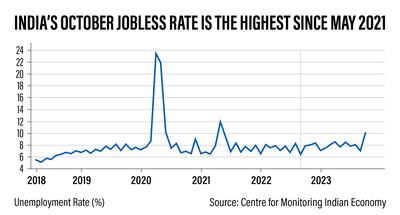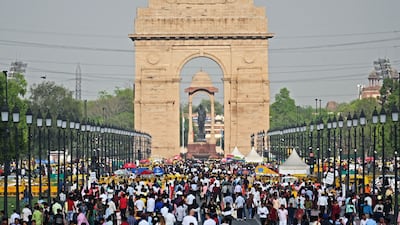India billionaire NR Narayana Murthy faced stiff social media backlash for his comments urging young Indians to work 70 hours a week to help the country grow.
While he faced criticism for his suggestion made during a podcast, he has also stirred a debate among Indian business leaders about what really is the right approach – work smarter or work harder?
As a developing economy, India continues to strive to boost growth. While some say longer working hours could increase productivity and help to achieve this goal, others argue there are more fundamental issues that India needs to tackle to address its challenges.
India would do better to ensure its population is equipped with the right skills which will increase productivity and help the economy grow faster both in the short and long term basis, experts say.
The debate has also highlighted the fact India needs to take steps to increase the productivity if it is to realise it true its economic growth potential.
Mr Murthy’s comment on the 70-hour week “is a wake-up call”, says Ambika Sharma, founder and managing director of Pulp Strategy Communications, a digital communications and marketing agency.
India's low productivity “means we are not productive in our eight-hour work shift”, she says.
India’s ranking in the latest Global Competitiveness Index partly reflects this gap. The country fell three places to 40th in this year's list, which is compiled by the International Institute for Management Development.
Mr Murthy, co-founder of Indian IT software company Infosys and father-in-law of UK Prime Minister Rishi Sunak, told The Record podcast that “India's work productivity is one of the lowest in the world".
"Unless we improve our work productivity ... we will not be able to compete with those countries that have made tremendous progress," he said.
He called on young Indians to work 70 hours a week to help address this shortfall and said “our culture has to change to that of highly determined, extremely disciplined and extremely hard-working people”.
Mr Murthy suggested that young people should “work 12 hours a day for the next 20 years, 50 years whatever it is ... so that India becomes number one or two in terms of GDP [gross domestic product]”.
Research suggests people in India already work some of the longest hours in the world.
The International Labour Organisation (ILO) said in its Wage Report 2020-21 that India ranked fifth among countries globally for long working hours, with the working week often hitting 48 hours.
This highlights that it is not simply a matter of toiling for longer, experts say.
While working a 70-hour week could have some economic and business benefits, there are a number of downsides, including “burnout, lower morale and job satisfaction, decreased work quality and health implications,” says Aditya Joshi, chief executive of OpalForce, a technology, semiconductor and talent solutions company.
Mr Murthy's remarks come in the wake of Covid-19 pandemic prompting more awareness among employees about the value of a healthy work-life balance.
Many have also come to expect more from companies.

“Improving productivity is a multifaceted challenge that requires co-ordinated policy action across various levels of government and co-operation with the private sector,” Mr Joshi says.
“It's a long-term endeavour that, if managed well, can sustain India's economic growth and development.”
He said those efforts should include simplifying procedures and cutting red tape to make it easier for businesses to operate and innovate. It should involve upgrading technology and aligning education and vocational training with industry needs to help reduce the skills gap.
“There's a definite need to enhance skill development in the Indian population,” Somdutta Singh, founder and chief executive of Assiduus Global, an e-commerce company says.
“Improving skills and enhancing productivity play a pivotal role in reducing unemployment and boosting the economy,” says Ms Singh, who is also an angel investor and adviser to the government of India.
“A skilled workforce is crucial for meeting the demands of a competitive job market and fostering economic growth. By empowering individuals with diverse skills, they become more employable, leading to a reduction in unemployment rates.”
Key areas that required attention included technological proficiency, vocational skills and adaptability to the changing job landscape, she says.
India needs to invest more in advancing science, technology, engineering and maths education, digital literacy and vocational training to improve the employability and productivity of citizens, she says.
“Soft skills like communication, problem-solving and critical thinking are equally vital in preparing individuals for the evolving job market,” Ms Singh adds.
India is striving to grow its economy and lift people out of poverty. With a population of more than 1.4 billion, the young potential workforce is often described as its “demographic dividend”.
But India still needs to harness that potential, economists say.
Santanu Sengupta, Goldman Sachs Research’s chief India economist, in a report published in July said the country was poised to become the second largest economy in the world by 2075.
“A key to realising the potential of that growing population is boosting participation within its labour force, as well as providing training and skills for its immense pool of talent,” he said.
S&P Global Market Intelligence said last month India was set to pass Japan to become the third largest economy by 2030, projecting that its GDP would double to $7.3 trillion by then.
“As India strides towards becoming the third-largest economy by 2030, enhancing workforce productivity is not just an option but a necessity," says Kartik Narayan, chief executive of staffing at TeamLease.
Long working hours would be required for India to upgrade the skills of its people, he adds.
“The discourse on the 70-hour workweek must be contextualised within the framework of India’s economic stage and productivity trajectory,” Mr Narayan says.
“In the current phase of our development, it may be necessary to invest additional hours to meet our ambitious targets. It’s imperative for professionals to acknowledge that surpassing the standard 40-hour threshold can be instrumental for personal and professional advancement, particularly through upskilling and productivity enhancement in a competitive talent.”
A shortage of skilled labour in India leads to a lack of employability, fuelling unemployment.
“India’s challenge is not the absence of jobs, but the scarcity of skilled talent to fill them,” Mr Narayan adds.
In October, India's unemployment rate rose to a more than two-year high of 10.05 per cent, up from 7.09 per cent in September, according to data from the Centre for Monitoring Indian Economy. That is despite India having one of the fastest growing economies globally.
“Significant skill shortages across key sectors impede economic advancement,” Mr Narayan says.
“Strategic skill development is vital for tackling unemployment, enhancing employability and driving economic dynamism. By aligning skill development with industry demands, we cannot only bolster the employability of our workforce but also fortify our position in the global economy through innovation and increased productivity.”
Meanwhile, the expectations that companies have of young people are only increasing.
“Employers seek candidates who are not only technically competent but also have strong soft skills, such as communication, teamwork and problem-solving abilities, due to the swiftly changing business environment and the rise of digitalisation,” he says.
However, a lot of effort was needed from the top to create an environment where India's skill levels increase. There are also several other areas that need to be addressed.
“A multifaceted strategic approach, encompassing infrastructure investment, digital transformation, skill development initiatives, regulatory simplification and fostering a culture of innovation and entrepreneurship, could provide the thrust needed to elevate productivity levels,” Mr Narayan says.
Productivity may be low in India, as Mr Murthy highlighted in his comments, but wages are also lower than many other parts of the world, according to the ILO.
There are needs for more reforms in India to address such challenges and boost the country's output, experts say.
“By implementing greater formalisation, labour reforms and new wage codes, the country can anticipate a surge in employment opportunities in the years ahead,” says Siva Prasad Nanduri, chief executive of Diensten Tech, an IT services and consulting company in Noida.

